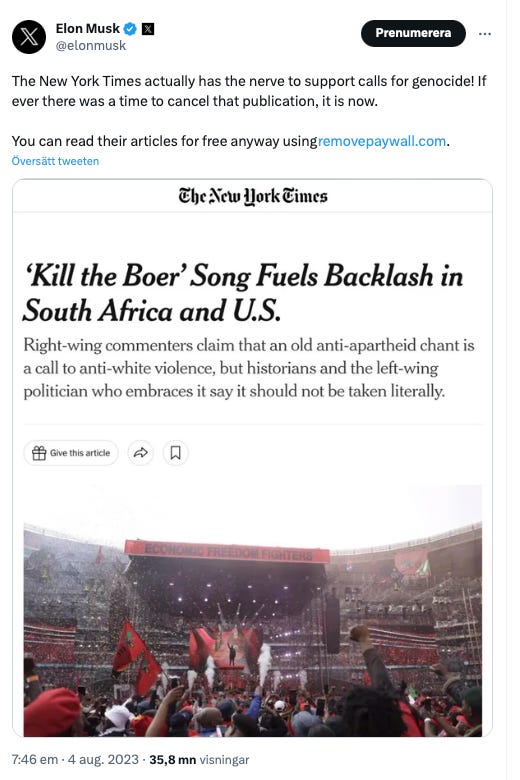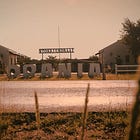Response to Incitement of Genocide
The incitement of genocide in South Africa and the world's reactions to it.
Dear Reader of South Africa Insight,
The EFF party, under the leadership of Julius Malema, sparked significant attention when they publicly sang about "killing the Boers", referencing South Africa's white minority. Astoundingly, approximately 100,000 people echoed this sentiment in chorus.
It's important to highlight that Malema has said in the past, "I have not called for the killing of white people – at least for now." When confronted about this statement, Malema has consistently stood by his words without any retraction.
I've produced a mini-documentary that delves into the implications of these anti-white sentiments. This documentary illuminates the Plaasmoorde monument. 'Plaasmoorde' translates to 'farm murders', and each cross at the monument represents a white farmer who has been murdered in South Africa. Since its release, the documentary has garnered over 1.4 million views.
The remarkable reach of the documentary is telling. Yet, both Western and Swedish mainstream media have remained notably silent on this topic. This silence is particularly striking given Sweden's unique historical ties to South Africa, notably its early support for the ANC.
This silence may suggest a reluctance to address perceived shortcomings in the so-called "rainbow nation", particularly as Sweden and much of the Western world, with their multicultural societies, might be moving in a similar demographic trajectory.
While Swedish mainstream media remains silent, The New York Times has suggested that it's "just a song" and shouldn't be taken too seriously, describing them as old protest songs.
I firmly believe we should pay heed to and respond to what people express. Sentiments like these are driving communities toward segregation and a defensive stance. I've been delving into content about Orania in South Africa, which serves as a poignant example of this phenomenon. More on Orania will be shared in upcoming newsletters. In the meantime, I'm actively editing a mini-documentary on Orania and penning a book on the topic.
If you haven't already, you can view the trailer for Orania here:
and read a chapter from the book in progress here:
ORANIA: Building a Nation One Brick at a Time
Dear South Africa Insight Reader, In our quest to understand the world, we often turn to history books, seeking stories of pioneers and adventurers who dared to veer off the beaten path. Yet sometimes, history isn't only a thing of the past - it's a dynamic story unfolding right before our eyes.
Beyond media's silence and The New York Times' reductive portrayal, my Plaasmoorde documentary has elicited both dismissive comments and, alarmingly, some that appear to wish for further tragedies.
This raises the question: What will it take to get a reaction, let alone international condemnation?
The current establishment is unlikely to provide answers. Instead, it falls upon us to shine a light on these issues, ensuring they don't go unnoticed.
An illustrative example of this establishment bias can be seen in my interview with Pierre Schori, our former aid minister in Sweden, who supported both Mugabe and the ANC from the 1960s onwards, regarding the genocide of whites in Zimbabwe. His immediate response invoked the 'original sin' concept. If what transpired in Zimbabwe were to repeat in South Africa, the establishment would likely downplay it, resorting to similar historical references, such as the idea of an ‘original sin’.
Consider the global response to George Floyd's death and the subsequent Black Lives Matter movement. Yet, when 100,000 South Africans collectively sing about killing whites, there's an unsettling silence.
In today's climate, asserting 'white lives matter' or 'it's OK to be white' is met with hostility or dismissal by the very same institutions that remain silent on the incitement against whites in South Africa.
We're living in an era marked by double standards. When someone expresses a white in-group preference, it is often labeled as hateful or even likened to Nazi sentiments. Conversely, for other ethnicities, such preferences are celebrated. Consider 'Black Pride', which is seen as an embrace of one's African heritage. In contrast, the term 'White Pride' carries a far more sinister connotation.
To address these anti-white sentiments, be it in South Africa or even Sweden, we need to unite under the simple understanding that it's acceptable to be white, and it's okay to prefer one's own group. Whether that means being Swedish and having an affinity for Swedes or being Afrikaaner and having a preference for Afrikaaners.
In today's narrative, certain truths are overshadowed or concealed. A shift in this narrative is imperative. The most effective way to catalyze this change is by illuminating these truths and standing resolutely by them.
Until next time
Jonas Nilsson









